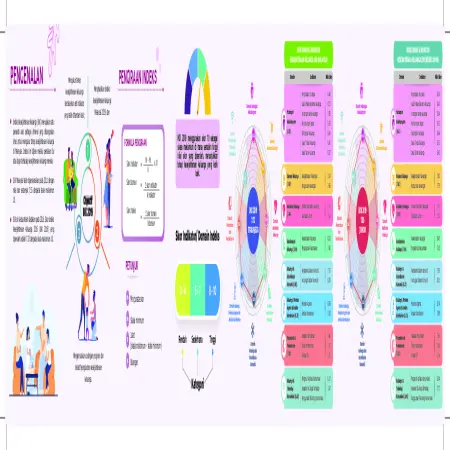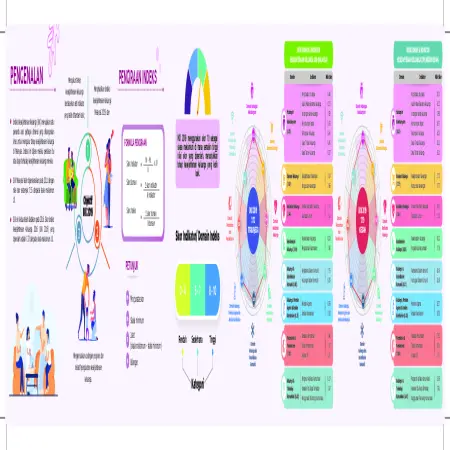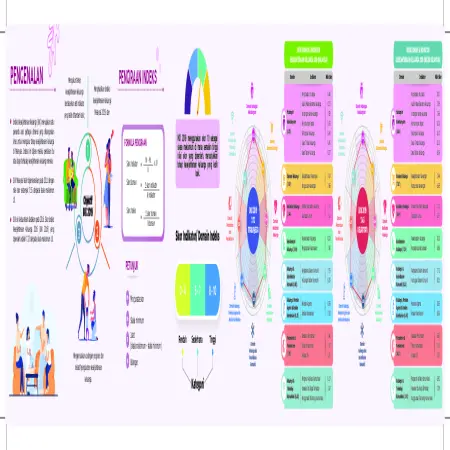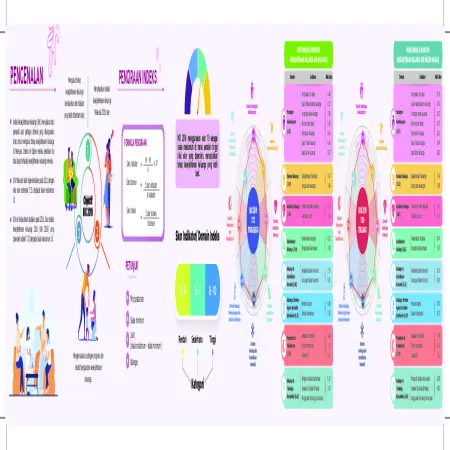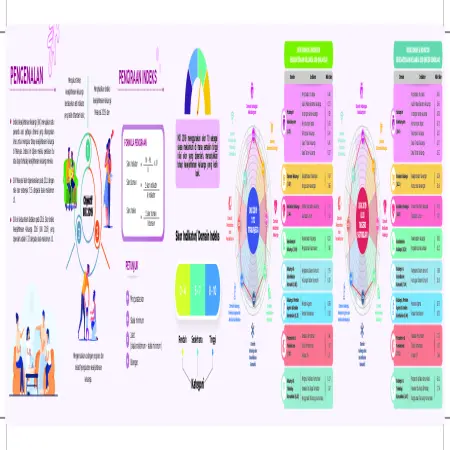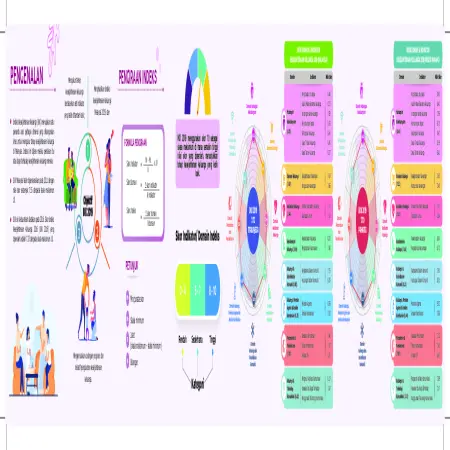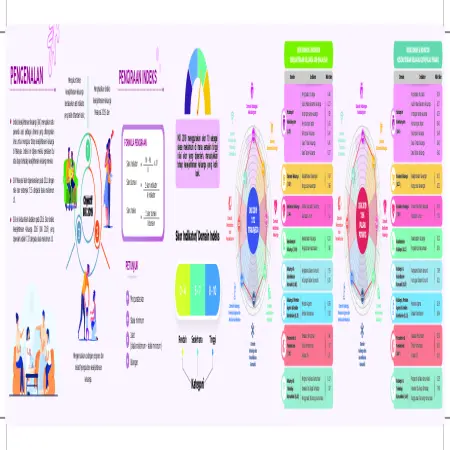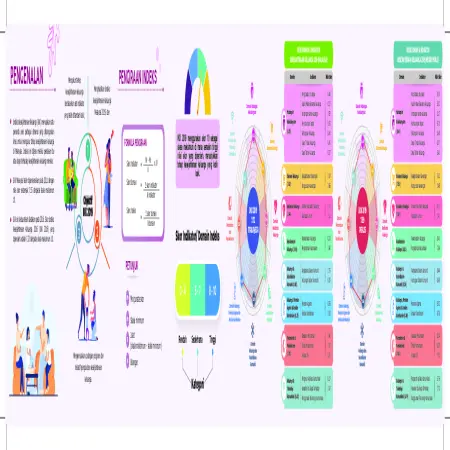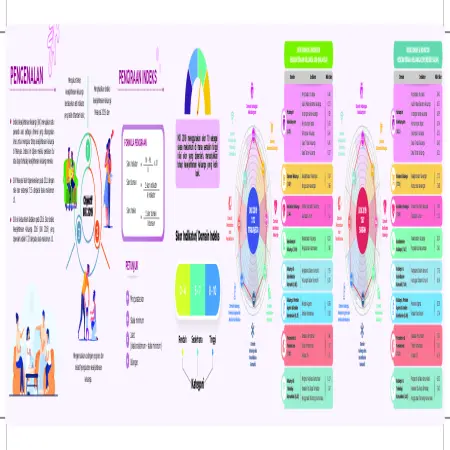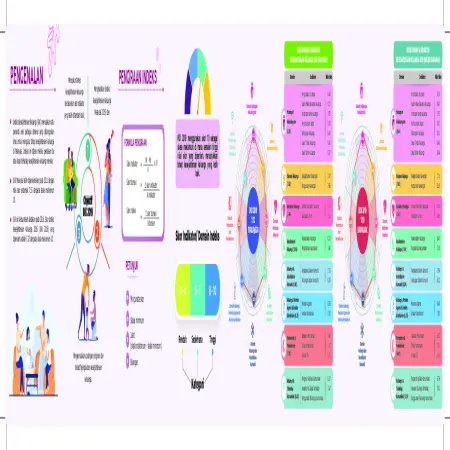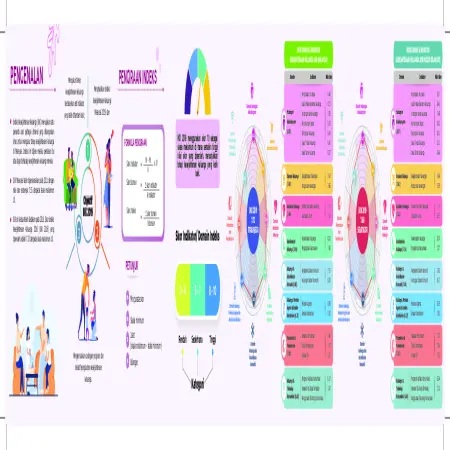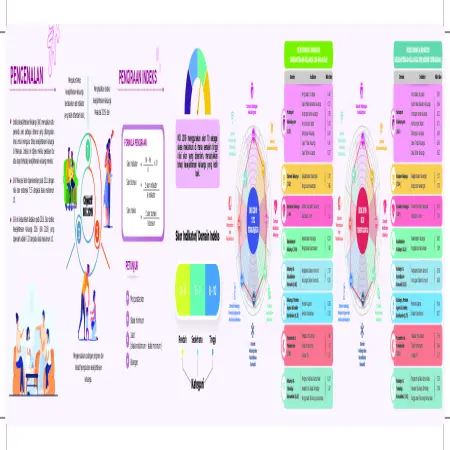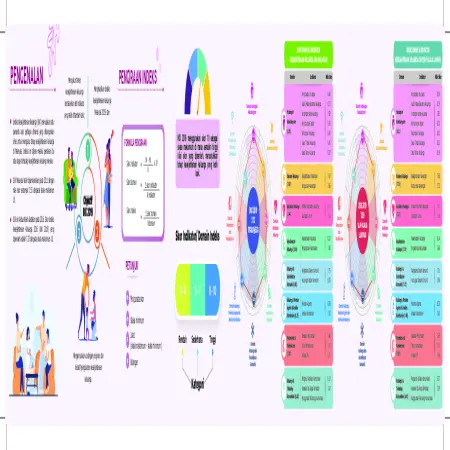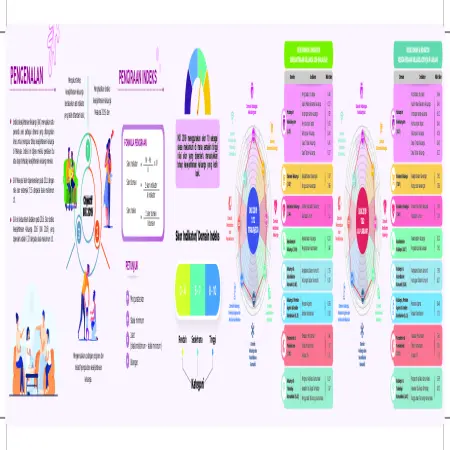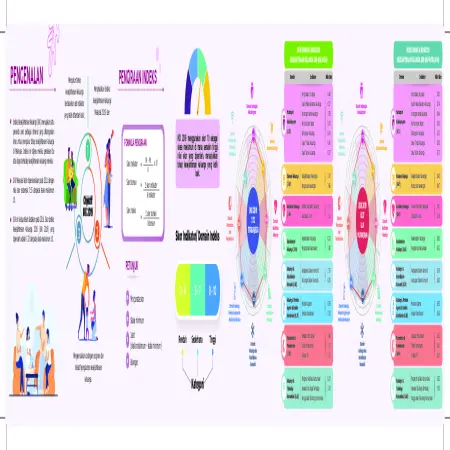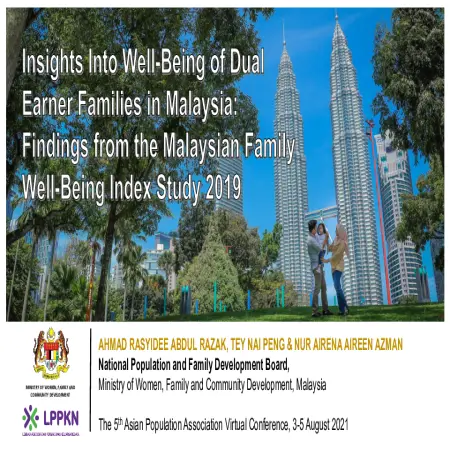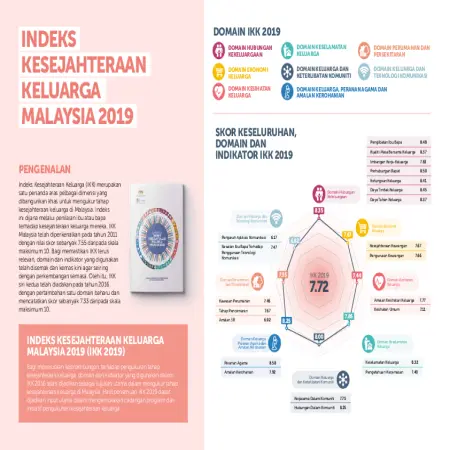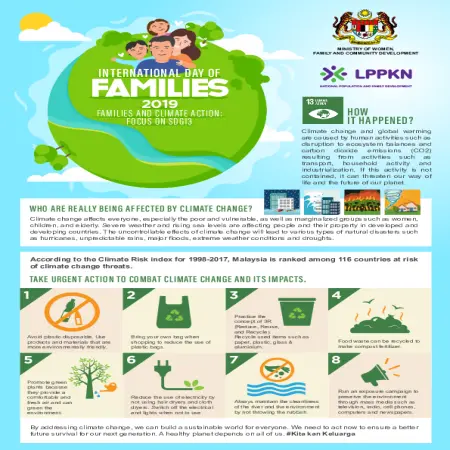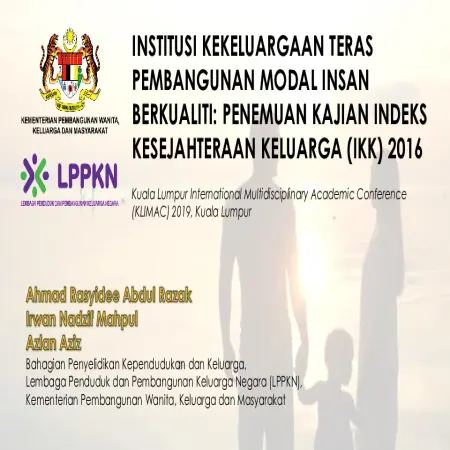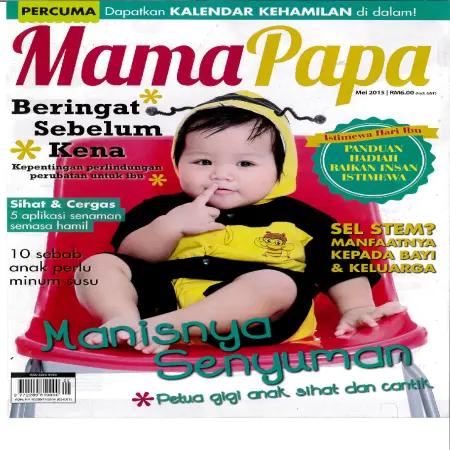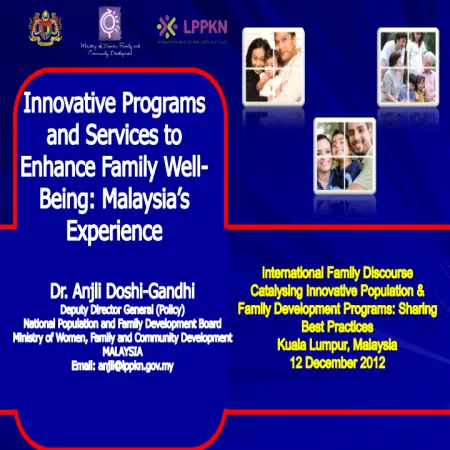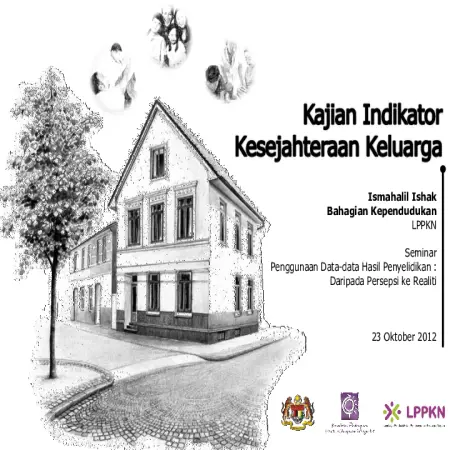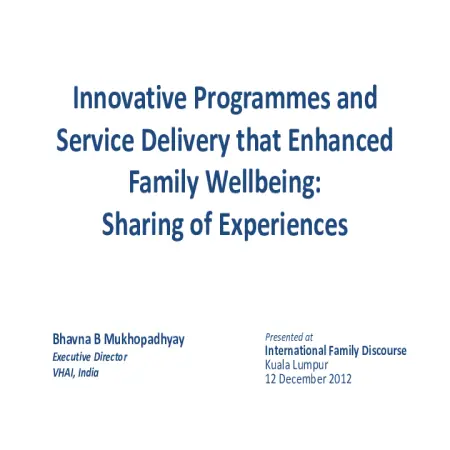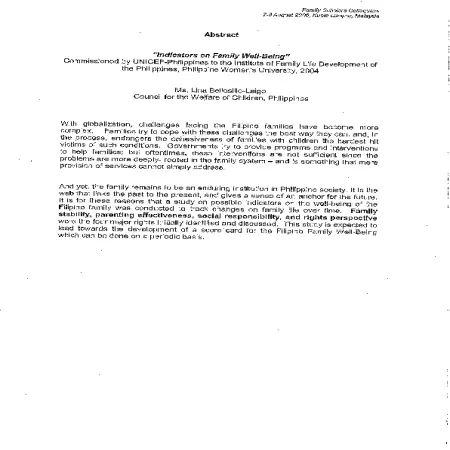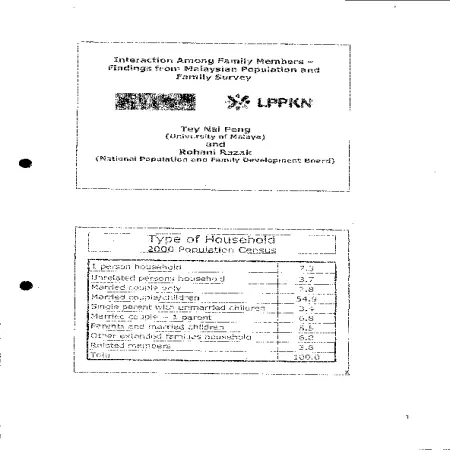TOPICS
Results for Topics : "Family"
2021 (18)
|
|
Impak positif daripada pandemik covid-19 kepada institusi kekeluargaan
Item Type: Article
Editor:
Year: 00/12/2021
Abstract: The world was shocked by the presence of the Covid-19 pandemic which changed the norms of human life from the usual. This effect also
felt by every family institution which is the basic group in a community. The routine in family life that has become a habit had to be changed because of it. Previous studies have found that there are various negative or positive impacts from this epidemic. This article places special emphasis on the positive impact of the Covid-19 pandemic on family institutions. The study is exploratory because it is a new issue with limited resources. The study literature is based on references obtained from reading sources related to the Covid-19 pandemic and the concept of new norms for family institutions. In addition to that, independent observation and experience are also the results of the study. The focus of the positive impact of this pandemic on family institutions is seen from a spiritual perspective, habits and attitudes. The result of this writing found that there are several lessons referring to the positive impact useful to be used as a reference or guide in the future. The concept of understanding and returning to religious teachings is the key to getting a positive impact from any form of calamity or disaster.
|
|
|
|
|
|
Indeks Kesejahteraan Keluarga Malaysia 2019 (IKK 2019) Negeri Johor
Item Type: Infographic
Editor:
Year: 00/00/2021
Abstract: The Family Well -Being Index (FWBI) is a multi -dimensional benchmark specially developed to measure the level of family well -being in Malaysia. This index is generated through a mother’s or father’s assessment of their family’s well-being. The Family Well-Being Index Score for Johor was 7.85 from a maximum score of 10, which was at the moderate level.
|
|
|
|
|
|
Indeks Kesejahteraan Keluarga Malaysia 2019 (IKK 2019) Negeri Kedah
Item Type: Infographic
Editor:
Year: 00/00/2021
Abstract: The Family Well -Being Index (FWBI) is a multi -dimensional benchmark specially developed to measure the level of family well -being in Malaysia. This index is generated through a mother’s or father’s assessment of their family’s well-being. The Family Well-Being Index Score for Kedah was 7.79 from a maximum score of 10, which was at the moderate level.
|
|
|
|
|
|
Indeks Kesejahteraan Keluarga Malaysia 2019 (IKK 2019) Negeri Kelantan
Item Type: Infographic
Editor:
Year: 00/00/2021
Abstract: The Family Well -Being Index (FWBI) is a multi -dimensional benchmark specially developed to measure the level of family well -being in Malaysia. This index is generated through a mother’s or father’s assessment of their family’s well-being. The Family Well-Being Index Score for Kelantan was 7.43 from a maximum score of 10, which was at the moderate level.
|
|
|
|
|
|
Indeks Kesejahteraan Keluarga Malaysia 2019 (IKK 2019) Negeri Melaka
Item Type: Infographic
Editor:
Year: 00/00/2021
Abstract: The Family Well -Being Index (FWBI) is a multi -dimensional benchmark specially developed to measure the level of family well -being in Malaysia. This index is generated through a mother’s or father’s assessment of their family’s well-being. The Family Well-Being Index Score for Malacca was 7.99 from a maximum score of 10, which was at the moderate level.
|
|
|
|
|
|
Indeks Kesejahteraan Keluarga Malaysia 2019 (IKK 2019) Negeri Sembilan
Item Type: Infographic
Editor:
Year: 00/00/2021
Abstract: The Family Well -Being Index (FWBI) is a multi-dimensional benchmark specially developed to measure the level of family well -being in Malaysia. This index is generated through a mother’s or father’s assessment of their family’s well-being. The Family Well-Being Index Score for Negeri Sembilan was 8.03 from a maximum score of 10, which was at the high level.
|
|
|
|
|
|
Indeks Kesejahteraan Keluarga Malaysia 2019 (IKK 2019)Negeri Pahang
Item Type: Infographic
Editor:
Year: 00/00/2021
Abstract: The Family Well -Being Index (FWBI) is a multi-dimensional benchmark specially developed to measure the level of family well -being in Malaysia. This index is generated through a mother’s or father’s assessment of their family’s well-being. .The Family Well-Being Index Score for Pahang was 7.70 from a maximum score of 10, which was at the moderate level.
|
|
|
|
|
|
Indeks Kesejahteraan Keluarga Malaysia 2019 (IKK 2019) Negeri Pulau Pinang
Item Type: Infographic
Editor:
Year: 00/00/2021
Abstract: The Family Well -Being Index (FWBI) is a multi -dimensional benchmark specially developed to measure the level of family well -being in Malaysia. This index is generated through a mother’s or father’s assessment of their family’s well-being. The Family Well-Being Index Score for Penang was 7.96 from a maximum score of 10, which was at the moderate level.
|
|
|
|
|
|
Indeks Kesejahteraan Keluarga Malaysia 2019 (IKK 2019) Negeri Perak
Item Type: Infographic
Editor:
Year: 00/00/2021
Abstract: The Family Well -Being Index (FWBI) is a multi-dimensional benchmark specially developed to measure the level of family well -being in Malaysia. This index is generated through a mother’s or father’s assessment of their family’s well-being. .The Family Well-Being Index Score for Perak was 7.17 from a maximum score of 10, which was at the moderate level.
|
|
|
|
|
|
Indeks Kesejahteraan Keluarga Malaysia 2019 (IKK 2019) Negeri Perlis
Item Type: Infographic
Editor:
Year: 00/00/2021
Abstract: The Family Well -Being Index (FWBI) is a multi-dimensional benchmark specially developed to measure the level of family well -being in Malaysia. This index is generated through a mother’s or father’s assessment of their family’s well-being. The Family Well-Being Index Score for Perlis was 7.99 from a maximum score of 10, which was at the moderate level.
|
|
|
|
|
|
Indeks Kesejahteraan Keluarga Malaysia 2019 (IKK 2019) Negeri Sabah
Item Type: Infographic
Editor:
Year: 00/00/2021
Abstract: The Family Well -Being Index (FWBI) is a multi-dimensional benchmark specially developed to measure the level of family well -being in Malaysia. This index is generated through a mother’s or father’s assessment of their family’s well-being. The Family Well-Being Index Score for Sabah was 7.67 from a maximum score of 10, which was at the moderate level.
|
|
|
|
|
|
Indeks Kesejahteraan Keluarga Malaysia 2019 (IKK 2019) Negeri Sarawak
Item Type: Infographic
Editor:
Year: 00/00/2021
Abstract: The Family Well -Being Index (FWBI) is a multi-dimensional benchmark specially developed to measure the level of family well -being in Malaysia. This index is generated through a mother’s or father’s assessment of their family’s well-being. The Family Well-Being Index Score for Sarawak was 7.78 from a maximum score of 10, which was at the moderate level.
|
|
|
|
|
|
Indeks Kesejahteraan Keluarga Malaysia 2019(IKK 2019) Negeri Selangor
Item Type: Infographic
Editor:
Year: 00/00/2021
Abstract: The Family Well -Being Index (FWBI) is a multi -dimensional benchmark specially developed to measure the level of family well -being in Malaysia. This index is generated through a mother’s or father’s assessment of their family’s well-being. The Family Well-Being Index Score for Selangor was 7.68 from a maximum score of 10, which was at the moderate level.
|
|
|
|
|
|
Indeks Kesejahteraan Keluarga Malaysia 2019 (IKK 2019) Negeri Terengganu
Item Type: Infographic
Editor:
Year: 00/00/2021
Abstract: The Family Well -Being Index (FWBI) is a multi -dimensional benchmark specially developed to measure the level of family well -being in Malaysia. This index is generated through a mother’s or father’s assessment of their family’s well-being. The Family Well-Being Index Score for Terengganu was 8.10 from a maximum score of 10, which was at the high level.
|
|
|
|
|
|
Indeks Kesejahteraan Keluarga Malaysia 2019 (IKK 2019) Wilayah Persekutuan Kuala Lumpur
Item Type: Infographic
Editor:
Year: 00/00/2021
Abstract: The Family Well -Being Index (FWBI) is a multi -dimensional benchmark specially developed to measure the level of family well -being in Malaysia. This index is generated through a mother’s or father’s assessment of their family’s well-being. The Family Well-Being Index Score for the Federal Territory of Kuala Lumpur was 7.59 from a maximum score of 10, which was at the moderate level.
|
|
|
|
|
|
Indeks Kesejahteraan keluarga Malaysia 2019 (IKK 2019) Wilayah Persekutuan Labuan
Item Type: Infographic
Editor:
Year: 00/00/2021
Abstract: The Family Well -Being Index (FWBI) is a multi -dimensional benchmark specially developed to measure the level of family well -being in Malaysia. This index is generated through a mother’s or father’s assessment of their family’s well-being. The Family Well-Being Index Score for the Federal Territory of Labuan was 7.82 from a maximum score of 10, which was at the moderate level.
|
|
|
|
|
|
Indeks Kesejahteraan keluarga Malaysia 2019 (IKK 2019) Wilayah Persekutuan Putrajaya
Item Type: Infographic
Editor:
Year: 00/00/2021
Abstract: The Family Well -Being Index (FWBI) is a multi-dimensional benchmark specially developed to measure the level of family well -being in Malaysia. This index is generated through a mother’s or father’s assessment of their family’s well-being. The Family Well-Being Index Score for the Federal Territory of Putrajaya was 8.37 from a maximum score of 10, which was at the high level.
|
|
|
|
|
|
Insights into the well-being of dual earner families in Malaysia: findings from the Malaysian Family Well-Being Index Study 2019
Item Type: Conference or Workshop Item
Editor:
Year: 00/00/2021
Abstract: Traditionally, GDP has been used as a measure of a country’s level of development, and the quality of life of citizens. Of late, the happiness index has gained increasing attention, as a measure of well-being, to include income distribution and non-financial aspects, such religious and spiritual well-being, and inter-personal relationship. Malaysia has conducted three rounds of the family well-being surveys to provide inputs for the five-year development plans. The overall family well-being score among dual earner families in Malaysia was 7.84 out of a maximum scale of 10, which is at the moderate level.
|
|
|
|
2020 (1)
|
|
Indeks Kesejahteraan Keluarga Malaysia 2019
Item Type: Infographic
Editor:
Year: 00/00/2020
Abstract: The Malaysian Family Well-Being Index is a multi -dimensional benchmark that specially developed to measure levels family well-being in Malaysia. Index is generated through maternal or paternal assessment to the well -being of their families. The Family Well-being Index 2019 score has increased to 7.72 from a maximum scale of 10 compared to 7.33 in 2016.
|
|
|
|
2019 (2)
|
|
International Day of Families 2019: families and climate action: focus on SDG13
Item Type: Infographic
Editor:
Year: 00/00/2019
Abstract: Climate change and global warming are caused by human activities such as discruption to ecosystem balances and carbon dioxide emissions (CO2) resulting from activities such as transport, household activity and industrialization. If this activity is not contained, it can threaten our way of life and the future of our planet.
|
|
|
|
2015 (1)
|
|
Imbangi keluarga dan kerjaya
Item Type: Article
Editor:
Year: 00/05/2015
Abstract: Based on the Fourth Malaysian Population and Family Survey (MPFS-4), it was found that overall, mothers do more leisure activities with their children, especially children under seven years old. This study found that the percentage of parents who often spend special time with their children is higher among mothers (80.2%) than fathers (65.3%). However, the percentage of those who frequently took their children on outings was almost the same between mothers (52.2%) and fathers (52.4%).
|
|
|
|
2012 (3)
|
|
Innovative programs and services to enhance family well-being: Malaysia's experience
Item Type: Conference or Workshop Item
Editor:
Year: 00/00/2012
Abstract: Families constantly face new pressures and challenges due to rapid Industrialisation, modernisation and globalisation. Globalization in general brings benefits to families but it also creates risks and challenges that must be anticipated and adapted to. Hence, we have to be alert and responsive to future challenges that families will face and equip them with the necessary knowledge, skills as well as provide the needed services. As family is the most fundamental and important social unit, commitments at the highest level should be sought. Family well-being in Malaysia has been affected positively or negatively by development. Currently, Malaysian families face many challenges as a consequence of the changes in its structure, the increase in the proportion of nuclear families and changing lifestyles. Adaptations will have to be made so as not to lose the family support system, such as for child care, care of the elderly and the infirmed. Hence, the 3P Approach (Public, Private and People) which involves the partnership of multiple stakeholders such as the government, civil society and CSOs in ensuring that the present and future generation is more peaceful, secure, tolerant, prosperous and sustainable is most paramount in nation building. There are various innovative initiatives that have been undertaken in strengthening the family institution such as the National Family Policy, 1Malaysia Family First (1MF1st) and 1 Malaysia Youth and Empowerment Support (1MYes) under the National Blue Ocean Strategy, Strengthening of Marriage Institution (SmartStart Pre-Marriage Program), 1 Stop Family Centre, family education programmes such as KASIH Modules, Parenting@Work, Smart Belanja@Lppkn, Lppkn@Community and counselling programmes. Realizing that the happiness of the people and wellbeing of the family is an important goal in becoming a high income country by 2020, the government is developing its own model of the United Nations World Happiness Index. Currently, Malaysia is placed 51st among 156 countries. Meanwhile, a National Family Wellbeing Index developed by the Ministry Of Women, Family and Community Development through the National Population and Family Development Board in 2011 found that the Family Wellbeing Index is 7.55 out of 10. The Family Well-Being (FWB) Index consists of seven domains; Family Functioning, Economy, Health, Safety, Community, Religion and Spirituality, and Housing and Environment. The FWB Index indicates that Malaysian families have a relatively high level of wellbeing but more still needs to be done.
|
|
|
|
|
|
Indikator kesejahteraan keluarga
Item Type: Conference or Workshop Item
Editor:
Year: 00/00/2012
Abstract: Family well-being is a multi-dimensional concept that covers various aspects of an individual or family's living situation. To date, there is no specific measure that can describe the state of family well -being in Malaysia. Thus, the Ministry of Women, Family and Community Development through the National Population and Family Development Board (LPPKN) and the International Islamic University of Malaysia (IIUM) has implemented a research project called the Study of Family Well -Being Indicators in 2011 to understand more comprehensively about family well -being where at the end of this project, an index will be developed. In total, after going through several formative processes such as literature review, focus group discussion and pilot study, there are 7 domains and 23 indicators have been identified. The development of such domains and indicators of family well-being has focused on subjective well-being where each family is asked to provide an assessment on certain aspects related to their family. The study was conducted on 2,808 households involving a total of 5,616 respondents, consisting of 1,484 fathers, 1,324 mothers and 2,808 adolescents aged between 13 to 24 years. The selection of households in this study has used stratified random sampling method and done by face -to -face interviews. The results show that the Family Well -Being Index is at 75.5 which means that the well -being of Malaysian families is quite high. The Family and Religion/Spirituality domain recorded the highest domain score of 82.5. This was followed by the domain scores Family and Community (78.3), Family Relationships (78.2), Family Safety (73.9), Family Health (73.8), Family and Environment (72.8) and Family Economics (69.0). Based on the results of the IKK study, some suggestions that can be taken into account to improve the level of family well -being are to improve family living standards, increase family resilience, balance work and family demands as well as increase awareness on family safety.
|
|
|
|
|
|
Innovative programmes and service delivery that enhanced family wellbeing: sharing of experiences
Item Type: Conference or Workshop Item
Editor:
Year: 00/00/2012
Abstract: While India has been on the path of economic progress over the last decade, our health system is at crossroads today. Even though Government initiatives in public health have recorded some noteworthy successes over time, the Indian health system is ranked 118 among 191 WHO member countries on overall health performance. There are wide variations in health indicators across the States (11 states with a population of 60%, still have a TFR of over 3 whereas 6 states with 11.4% of the population have already achieved replacement levels of fertility of 2.1. Some of the flagship programmes to improve the availability of and access to quality health care, especially for those residing in rural areas, the poor, women, and children, have been National Rural Health Mission (NRHM) and Mahatama Gandhi National Rural Employment Guarantee Act (MGNREGA). This paper discusses the sharing of information on the health system in India.
|
|
|
|
2006 (2)
|
|
Indicators on Family Well-Being
Item Type: Conference or Workshop Item
Editor:
Year: 00/00/2006
Abstract: With globalization, challenges facing the Filipino families have become more complex. Families try to cope with these challenges the best way they can, and, in the process, endangers the cohesiveness of families with children the hardest hit victims of such conditions. Governments try to provide programs and interventions to help families but oftentimes, these interventions are not sufficient since the problems are more deeply-rooted in the family system and is something that mere provision of services cannot simply address. And yet, the family remains to be an enduring institution in Philippine society. It is for these reasons that a study on possible indicators on the well-being of the Filipino family was conducted to track changes on family life over time. Family stability, parenting effectiveness, social responsibility, and rights perspective were the four major rights initially identified and discussed. This study is expected to lead towards the development of a score card for the Filipino Family Well-Being which can be done on a periodic basis.
|
|
|
|
|
|
Interaction among family members: a Malaysian case study
Item Type: Conference or Workshop Item
Editor:
Year: 00/00/2006
Abstract: The perceived relationship among family members are 98.5% of women said that they have good family relationship while 99% of men said the same. Meanwhile, 99.3% of women who did not have financial difficulty stated that they have good family relationship compared to those who have financial difficulty represented by 98.3%.
|
|
|
|






